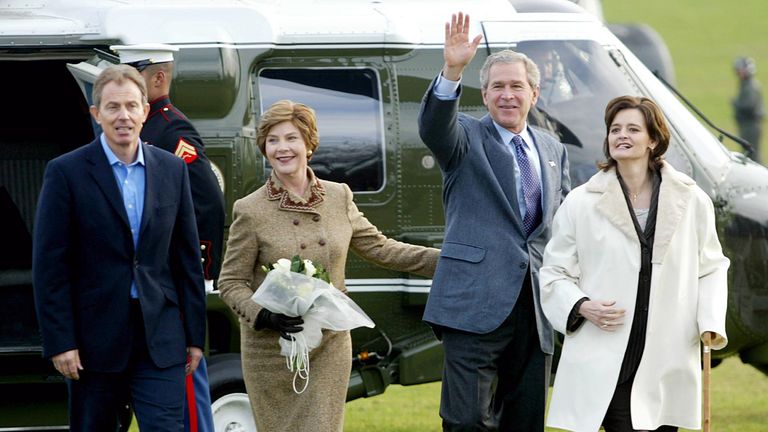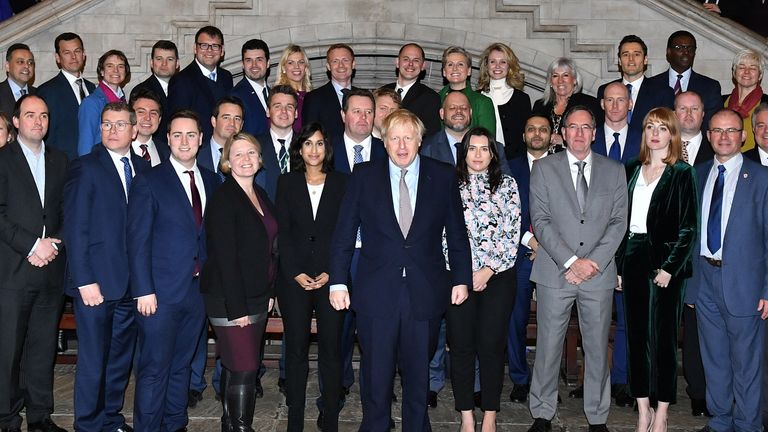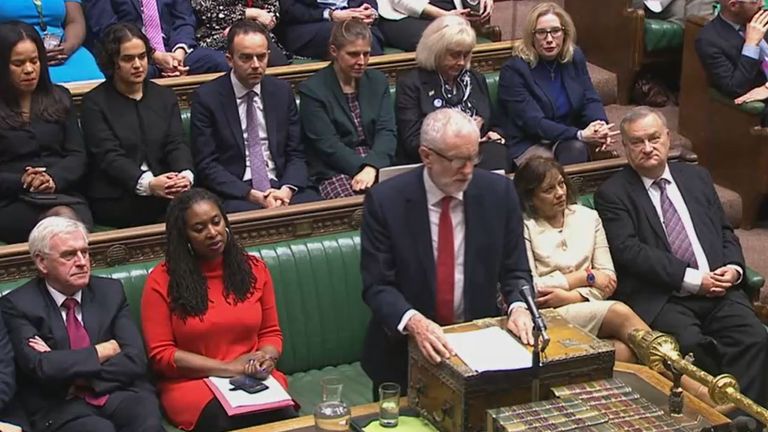Number 10 is strong but politics set to be anything but stable in 2020
Boris Johnson has the numbers to re-cast Britain as he sees fit, and build a legacy over the next five years.
Tuesday 7 January 2020 09:55, UK
Parliamentarians are back in Westminster this week as we turn the page on a decade which began in the ruins of the 2009 financial crisis, economic recession and austerity, and ended with Boris Johnson winning the biggest parliamentary majority since the days of Tony Blair.
After two referenda and three general elections in relatively quick succession, the British people gave their verdict on years of political instability and infighting as they awarded Mr Johnson what had eluded his predecessor Theresa May in the 2017 election; enough MPs to form a "strong and stable" government.
We are back in many ways to politics as usual. Parliament has been largely incapacitated once more. MPs can debate and oppose government policy but no longer have the power to frustrate or curtail the government. All the drama of the green benches and the Brexit wars that defined politics over the past three years is over.
Mr Johnson now has the numbers to re-cast Great Britain as he sees fit and build his legacy as one of the most significant prime ministers in modern history alongside Thatcher and Blair.
But Mr Johnson's strong government doesn't necessarily mean politics will be stable, as the early days of 2020 have so acutely demonstrated with President Trump's decision to kill top Iranian general Qassem Soleimani.
That decision has thrown global powers into crisis amid fears that the shadowy war between Tehran and Washington could slide into an all-out conflict.
How to navigate between an impulsive US president whom Mr Johnson has courted as an ally, his EU partners and UK's self-interest is the first big test for Mr Johnson.
He can ill-afford to alienate President Trump with whom he needs to strike a trade deal, nor will he want to antagonise EU allies ahead of Brexit and critical trade talks in Brussels.
:: Listen to Sophy Ridge on Sunday on , , ,
Perhaps mindful of that, Mr Johnson has neither rebuked President Trump nor offered his fulsome support for the killing. Instead he has released a joint statement with fellow EU leaders - Emmanuel Macron and Angela Merkel - as he seeks to maintain unity while urging restraint from his US ally.
But if this conflict escalates it will be increasingly difficult for Mr Johnson to keep bridging the transatlantic divide and avoid being dragged into it by his biggest ally.
This was the path Tony Blair chose at the turn of the century when he went to war in Iraq with President George W Bush. That war has defined his legacy, eviscerating his record as Labour's most electorally successful and longest-serving prime minister.
With Iran undoubtedly his most pressing crisis, how to navigate Brexit is also of risk to the prime minister who swept back into Downing Street with a tub-thumping majority having promised not only to "get Brexit done" but to "unleash Britain's potential" in a bountiful post-Brexit nirvana.
The prime minister has the comfort of knowing parliament will not block his Brexit divorce deal while he has the parliamentary numbers to drive through a basic trade deal, or even no-deal, by the end of the year.
But his new cliff-edge of December 2020 again brings about the prospect of instability for British businesses and the economy.
Mr Johnson is adamant that the UK must leave - if necessary on World Trade Organisation terms, with tariffs, quotas and regulatory checks - by the end of the year.
But he knows that safeguarding the trading relationship between the EU and the UK - worth £650bn in 2018 - will be critical to his health of the UK economy and his ability to invest in public services.
So do the markets, which is why sterling gave up its post-election rise after Mr Johnson insisted just before Christmas he would write into law his promise to quit the EU at the end of 2020 whether he'd locked in a trade deal or not.
The prospect of a hard exit at the end of the year rattled markets and businesses, who fear a sudden imposition of tariffs and regulatory barriers on UK-EU trade could lead to gridlock at the ports and damage the economy.
Downing Street might want to ban the word Brexit from Whitehall's lexicon but the progress of the trade talks and the decisions Mr Johnson takes on alignment to EU rules and regulations will be a critically important to the economy and to his reign.
Mr Johnson will struggle to 'level up' different regions around the country and pour investment into hospitals, transport, the police and schools if the UK economy is stuttering.
Another unknown for Mr Johnson is who he will face across the dispatch box come April when the new Labour leader is elected.
Much of the talent within the party - from Yvette Cooper to Rachel Reeves, Lisa Nandy, Jess Philips, Stephen Kinnock - was put out to pasture during the Corbyn years.
The infighting and factionalism within the party, coupled with an ineffective leader, served up a weak opposition and helped gift the Conservatives power for another five years.
Now the party has a choice between electing another iteration of Mr Corbyn or picking a candidate that can broaden Labour's appeal.
A revival of the Labour Party under a new leader beyond the Corbyn camp, could ignite should Mr Johnson stumble over Brexit or fail to deliver the promises he made in the election to those former Labour supporters who lent the Conservatives their vote.
But the journey back for the party is long and arduous. To secure a majority victory the Labour Party would need a bigger swing of voters back to them (11.8%) than Tony Blair enjoyed in his landslide victory of 1997 (10.2%). Labour would have to gain seats such as Hexham and Bournemouth West which it has never won.
The scale of the task suggests that Mr Johnson's Conservatives could be in power for not just one more term but at least two.
But as the beginning of the 2020s reminds us, a big parliamentary majority doesn't necessarily end political and diplomatic drama which this week moved to the the global stage.
Mr Johnson must navigate the Iranian crisis and then turn his mind to his biggest challenge yet - delivering Brexit without damaging the economy.









